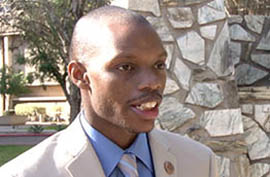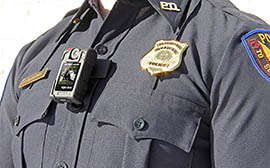Cronkite News has moved to a new home at cronkitenews.azpbs.org. Use this site to search archives from 2011 to May 2015. You can search the new site for current stories.
Lawmaker: Requiring body cameras for all police officers would build trust
PHOENIX – With some police departments in Arizona and elsewhere saying the use of body cameras has reduced complaints against officers, a state lawmaker says requiring their use everywhere would promote trust and collaboration.
“Recently I’ve had many conversations with people in my district who are concerned by the number of officer-involved shootings across the country and here in Arizona,” said Rep. Reginald Bolding, D-Phoenix. “I’ve talked to law enforcement officers who feel the need for our citizens to feel more engaged but also feel the need for themselves to show transparency as well.”
Bolding introduced HB 2511, which would require every peace officer in Arizona to wear a camera that records audio and video while performing duties that are likely to result in a criminal investigation or arrest. The attorney general would have to establish guidelines for their use.
Bolding also introduced HB 2512, which calls for independent external investigations of any fatal officer-involved shooting.
“These two bills provide mutual protection for both community members and also law enforcement officers,” he said at a news conference Wednesday, Jan. 21, announcing the legislation.
Following unrest over fatalities involving police in Ferguson, Mo., New York City and elsewhere, the Obama administration last month announced a $263 million program to provide law enforcement up to 50,000 body cameras.
Michael Frazier, president of the Arizona Association of Chiefs of Police and chief of the Surprise Police Department, which has used body cameras since 2013, said he didn’t know enough about Bolding’s proposal to comment on it.
“What I will say is that I am strongly supportive of the technology,” he said. “It has been very helpful and useful to our department and I think that all departments are going to take a strong look at it.”
Much of the $200,000 used to buy and implement the 80 to 90 cameras used by Surprise police officers came from asset-forfeiture proceedings. Not every department has access to such funds or the resources to buy cameras, Frazier said.
“If someone ever went so far as to say they were going to mandate them, you would put some departments in a very difficult situation,” he said.
Surprise hasn’t seen a significant drop in complaints against officers because of body cameras, but more complaints have been resolved, Frazier said.
“I have been a proponent of them all along,” he said. “And they have not failed me in what my beliefs were.”
The Mesa Police Department reported a drop in departmental complaints – 18 versus 40 from October 2012 to September 2013 compared to the 12 months prior – during a trial of body cameras. There was one use-of-force complaint during the trial compared to four during the previous 12 months, it said.
Bolding’s bill wouldn’t provide funding for departments needing to purchase cameras, but he said there is money out there.
“Right now there are federal grants that local law enforcement agencies and departments are already tapping into,” Bolding said. “Phoenix Police Department, they’re one case of a department that is continuing to use body cameras and taking advantage of federal dollars.”
Ken Strobeck, executive director of the League of Arizona Cities and Towns, said he couldn’t comment on Bolding’s bill without knowing more about it but said unfunded mandates can be troublesome, especially for smaller communities with smaller budgets.
In addition to the cost of the cameras themselves – a model offered by Scottsdale-based Taser sells for $399 – departments must acquire software, secure video storage and more to use them, as well as providing training and oversight.
For example, the Mesa Police Department’s report noted that officers needed tablet computers to more efficiently log video from their cameras.
Bolding said the transparency body cameras provide makes them essential.
“No matter what the cost is, if we believe that our citizens should feel safe by those who are protecting them then we’ll put the money into it,” he said.








